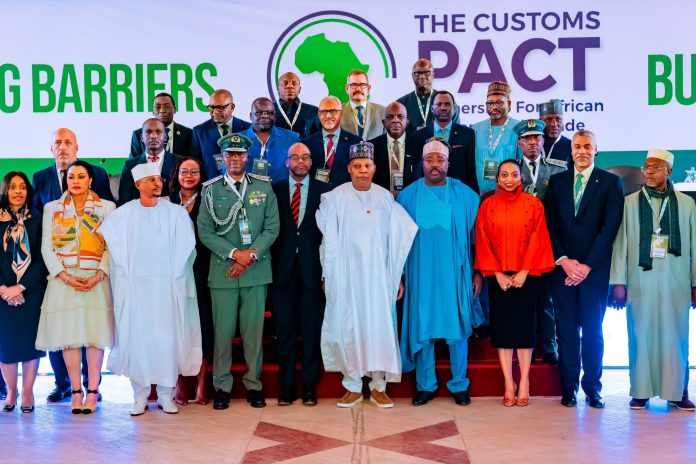Nigeria’s Minister of Industry, Trade and Investment, Dr. Jumoke Oduwole, joined regional and international trade stakeholders on Tuesday at the Customs Pact Roundtable, an event focused on harmonizing efforts to strengthen Africa’s trade environment and accelerate progress toward the continent’s shared development ambitions.
The gathering brought together policymakers, customs authorities, private-sector actors, and development partners to address the evolving demands of Africa’s trade ecosystem. Discussions centered on ensuring operational alignment across countries, enhancing coordination, and maintaining momentum toward the African Union’s long-term vision encapsulated in the agenda for “the Africa We Want.”
Dr. Oduwole praised the leadership of the Comptroller-General of the Nigeria Customs Service, Alhaji Bashir Adewale Adeniyi (MFR), commending his commitment to modernizing customs operations and positioning them as strategic enablers of trade. She noted that his ongoing reforms—particularly around automation, policy simplification, and stakeholder engagement—reflect a collaborative spirit essential for Nigeria’s broader trade facilitation goals.
Addressing the global shifts reshaping international commerce, the minister highlighted that services now account for more than half of global trade, representing one of the fastest-growing sectors worldwide. She emphasized that Nigeria is already witnessing this trend domestically, as services—from finance and logistics to creative industries and digital platforms—continue to drive economic growth and job creation.
In light of this transformation, Dr. Oduwole underscored the urgent need for African Customs Services to fully embrace digitisation. Modern trade, she said, requires fast, transparent, technology-driven systems capable of supporting e-commerce, reducing bottlenecks, lowering transaction costs, and increasing competitiveness. Digital public infrastructure, including interoperable platforms and automated customs processes, will be critical to achieving these goals.
However, she cautioned that technological progress must be accompanied by deliberate efforts to ensure that no one is left behind. “Technology will move Africa forward — inclusivity will ensure everyone moves with it,” she said, stressing the importance of capacity building, equitable access, and reforms that support small businesses, women, youth, and underserved communities.
Stakeholders at the roundtable agreed that the combination of policy alignment, institutional collaboration, and digital innovation is essential to unlocking the full potential of intra-African trade, particularly under the African Continental Free Trade Area (AfCFTA).
ANTHONY EMEKA NWOSU




